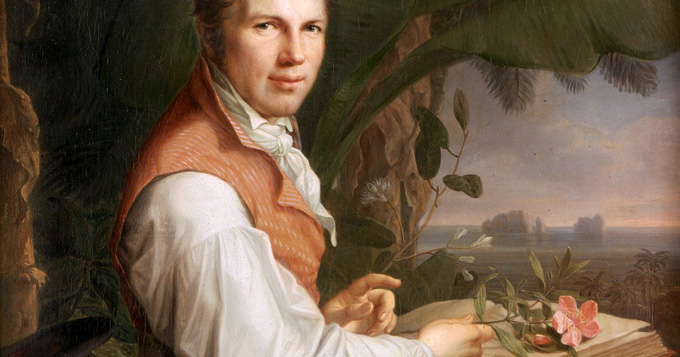Sublime
An inspiration engine for ideas
In 1869, in Boston, on the 100th anniversary of Humboldt’s birth, Agassiz, by then America’s most renowned naturalist, would recount in a long speech the incredible life of his mentor, the monumental productivity right up until the end, the trip to the Urals in 1829, the historic series of lectures in Berlin, the friendship with Goethe, the new car
... See moreDavid McCullough • Brave Companions
But knowledge, for Humboldt, wasn’t merely an intellectual faculty — it was an embodied, holistic presence with life ... See more
Alexander von Humboldt • Alexander von Humboldt and the Invention of Nature: How One of the Last True Polymaths Pioneered the Cosmos of Connections
The young Latin American intellectual Simón Bolívar had sought him out in Rome one year to talk about political freedom. John Charles Frémont, who regarded Humboldt as a god, had gone off exploring and sprinkled Humboldt’s name all over the map of Nevada. John Bachman would say that his own interest in natural history began with meeting Humboldt at
... See moreDavid McCullough • Brave Companions
He would be regarded as the incomparable high priest of nineteenth-century science—a towering godlike inspiration to such a disparate assortment of individuals as John Charles Frémont, John James Audubon, John Lloyd Stephens, Sir Charles Lyell, Simón Bolívar, W. H. Hudson, William Hickling Prescott, Edward Whymper, Charles Darwin, Louis Agassiz. Da
... See moreDavid McCullough • Brave Companions
Alexander von Humboldt—Friedrich Wilhelm Karl Heinrich Alexander von Humboldt—or Baron von Humboldt, as he was commonly addressed. He had been born in Berlin on September 14, 1769, the second son of a middle-aged army officer, a minor figure in the court of Frederick the Great, and of a rather solemn, domineering young woman of Huguenot descent who
... See moreDavid McCullough • Brave Companions
Humboldt died on May 6, 1859. He was in his ninetieth year and still at work, on the final volume of Cosmos. He had never returned to Spanish America, unlike Bonpland, who, after serving for a time as the head of the Empress Josephine’s gardens, left Paris for South America, where he finished out his days. But for all the years that had passed, for
... See moreDavid McCullough • Brave Companions
Humboldt revolutionized the way we see the natural world. He found connections everywhere. Nothing, not even the tiniest orga... See more
Alexander von Humboldt • Alexander von Humboldt and the Invention of Nature: How One of the Last True Polymaths Pioneered the Cosmos of Connections
All told they spent nearly two years in Colombia, Ecuador, and Peru. From Bogotá they went over the Andes on foot, picking the more difficult of two possible routes. They were in the Andes, crossing and recrossing, from September 1801 until October 1802, and they must have made a picturesque caravan, with their guides and mules and scientific instr
... See moreDavid McCullough • Brave Companions
Alexander von Humboldt and the Invention of Nature: How One of the Last True Polymaths Pioneered the Cosmos of Connections
Alexander von Humboldtthemarginalian.org